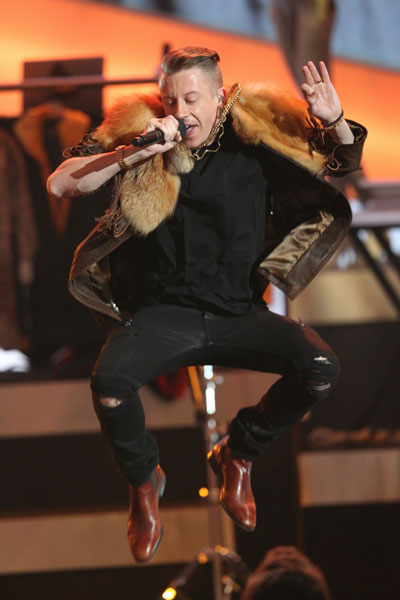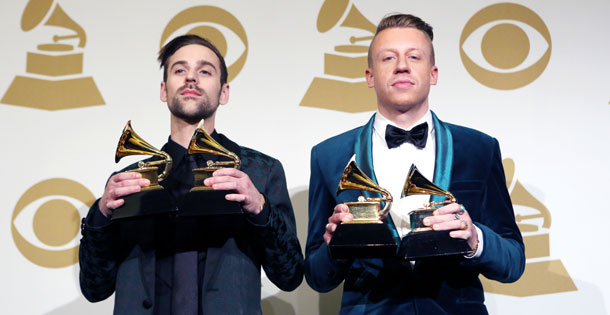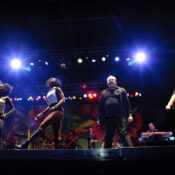After winning the Grammy Awards for Best Rap Album, Macklemore texted fellow rapper Kendrick Lamar: “You got robbed. I wanted you to win. You should have. It’s weird and it sucks that I robbed you.” He soon posted a screenshot of this text on Instagram, simultaneously speaking directly to Kendrick and broadcasting his message via social media to millions.
It’s no surprise that Macklemore won. His album, The Heist, has garnered both critical acclaim and mass appeal, selling more than a million copies. Two of its songs, “Can’t Hold Us” and “Thrift Shop,” reached the #1 spot on the Billboard Hot 100. No one in hip hop or rap has been as commercially ubiquitous in 2013.
But members of the Grammy rap committee apparently attempted to exclude Macklemore’s songs “Thrift Shop” and “Same Love” from the rap categories “because of their success on mainstream radio and their appeal in the pop world.” An undisclosed source within the Grammy Committee recently described the debate to a member of the Associated Press:
“It’s not that they don’t think he’s a rapper. It’s just that when you’re trying to protect categories and someone has become popular, it should be judged as much…Where does their music exist? Who are their fans?”

Eventually, the committee unanimously decided that Macklemore should remain in the rap categories because, though he might appeal to audiences who typically don’t listen to rap music, it’s hard to deny he makes rap music. As Ebro Darden from New York’s Hot 97 said to the Associated Press, “If you’re rapping over a beat, it’s hip hop.”
But is Macklemore’s The Heist really the best rap album of the year? Most hip hop fans–and apparently Macklemore himself–disagree. Here’s where Kendrick Lamar comes in. His album good kid, m.A.A.d. city has been widely recognized as one of the best rap albums of recent years.
It’s also much closer to the central themes of hip hop than The Heist is. Good kid, m.A.A.d. city takes place in Compton, where Kendrick Lamar grew up. It talks about typical hip hop themes like gang violence and alcohol without endorsing them. Macklemore’s subjects, which include gay rights and thrift stores, are more unusual. Some critics have praised him for introducing new themes into the genre, but others have accused him of appropriating hip hop to promote ideas that are otherwise alien.
Why does all this matter? The Grammys aren’t renowned for being right. They’re normally somewhat stodgy. Recent Album of the Year winners include Robert Plant, Herbie Hancock, and Ray Charles. The rock categories in particular tend to look backwards, with nominees this year including Led Zeppelin, David Bowie, Black Sabbath, and Neil Young. Contemporary rockers rarely demand recognition from the Grammys. Many simply ignore the awards.
Yet hip hop artists and fans have long expressed resentment toward the Grammys. When the Rap Performance category was created in 1989, many nominees, including Will Smith and LL Cool J (who hosted this year’s ceremony) boycotted the awards because the rap award wasn’t televised. Public Enemy joined the boycott in 1991; their label head, Russell Simmons, described the Grammys as “the same old broken-record snub of inner-city contributions to the music industry.” More recent boycotters include Kanye West and Jay-Z, who performed at this year’s ceremony alongside his wife, Beyoncé.

The Grammys have also failed to recognize hip hop with its larger awards. Hip hop acts have only won Album of the Year twice, and no rap song has ever won Song of the Year or Record of the Year. In one interview, Kanye West speculated that he had won more Grammys than anyone his age, without ever winning against a white person; his 21 Grammys make his first claim true, though he has defeated a white artist once, when he won Rap Album over Eminem in 2006.
The Grammys have a huge audience: nearly 30 million people watched this year’s awards. The ceremony actually is, as its organizers claim, “music’s biggest night.” The awards not only boost sales, they present their winners as the best in music. After 25 years of frustration, hip hop fans naturally object when the Grammys award a commercially popular white artist over one of the most beloved stars in hip hop.
But the Grammy Awards aren’t the final word in music. Kendrick Lamar’s performance with Imagine Dragons won as much praise as any this year. And the next day saw his Spotify traffic double. Kendrick has since said that Macklemore deserves recognition. “It’s well deserved; he did what he did, man,” Kendrick told XXL magazine. “He went out there and hustled and grinded. Everything happens for a reason; the universe comes back around, that’s how it go.”
Become a Saturday Evening Post member and enjoy unlimited access. Subscribe now



